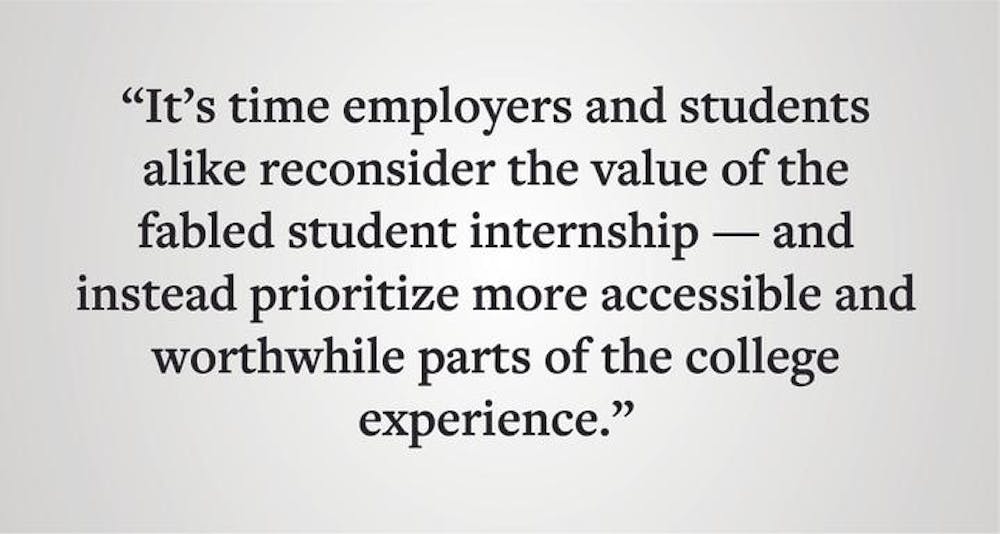Positions applied to on Handshake that you’ll likely never hear back from, a mountain of cover letters to fit every application, LinkedIn posts from your peers flaunting their job acceptances: These are the emblems of the dreaded student internship search process. As the summer draws closer and many of us scramble to muster some clarity over our professional pursuits before upcoming deadlines, it’s glaringly clear that internships have lost much of their value, more indicative of connections than qualifications. It’s time employers and students alike reconsider the value of the fabled student internship — and instead prioritize more accessible and worthwhile parts of the college experience.
If you’ve talked to a senior recently, you’ve probably heard about how hard it is to get a job these days. Gone are the days when a college — or even Ivy League — degree was enough to stand out in the application process. It doesn’t help that an estimated four in 10 companies posted ghost jobs, or jobs that don’t actually exist, in 2024. These fake jobs not only frustrate applicants, but they also give the appearance that the job market is stronger than it actually is, gaslighting the multitudes of college graduates who are struggling to enter the workforce.
To get ahead in this competitive job market, many students rely on family connections to secure a job. This is only compounded by the existence of nepotism in the internship selection process, further stacking the deck against groups like first-generation college students who have historically struggled in the job market. Even getting an internship has become a herculean task, with some students applying to hundreds of opportunities before finally landing even just one.
With many entry-level jobs now requiring years of prior work experience, students unable to acquire a summer internship face real consequences. These implications have created a high-pressure environment on college campuses across the country. As a sophomore, I’ve felt this stress at Brown, and it has led me to apply to dozens of summer internships in a variety of fields. While some of these opportunities are genuinely interesting to me, I find myself applying to things out of fear rather than passion more often than not. I’m terrified of the possibility that I’ll spend my summer doing something I can’t put on my resume, and I doubt I’m alone in this feeling.
As the price of attending college rises, getting a bachelor’s degree has become less about education and more about finding an internship, even if it’s just to ensure that the investment pays off. This is visible in the fact that a school as laid-back as Brown has over a dozen different undergraduate clubs focused on helping students break into professional industries. There is no reason students fresh out of high school should be worrying about getting into these pre-professional clubs, many of which require extensive applications — just like the internships they claim to help their members land. As students, we should be focused on learning and discovering what we want to do with our lives. Instead, we are expected to get internships that are relevant to our careers before we’ve even graduated, at the risk of not being competitive applicants in the future.
While universities like Brown still try to prioritize career exploration through approaches like the Open Curriculum, companies rely on internships to lock down young talent as soon as possible. Things like return offers and assessment-based hiring have made it painfully obvious that internships are no longer a tool for student self-discovery. Instead, they exist primarily to give companies a steady supply of undergraduates who have little other experience or options. This predatory system is most visible in fields like finance, where interns often work 70 to 80 hours a week only to graduate into higher-pressure roles. Rather than travel, work at a local business or spend time with family, the current system encourages students to spend their last free summers before retirement in a dingy office building in New York City. This is both unsustainable and cruel.
Recent increases in college enrollment, outsourcing and AI have all contributed to an incredibly competitive white-collar labor market, and internships continue to be the gold standard for how companies evaluate applicants for competitive positions. Instead of focusing so much on internships, companies should prioritize other activities like undergraduate research, personal projects and part-time jobs when evaluating candidates — and make entry-level jobs entry-level again. As students, we can do our part by recognizing that internships are only one part of our college experience. Clubs, classes and friendships can be just as, if not more, valuable, so let’s enjoy them while we still can.
Gray Bittker ’27 can be reached at gray_bittker@brown.edu. Please send responses to this op-ed to letters@browndailyherald.com and other opinions to opinions@browndailyherald.com





